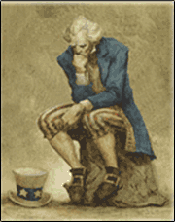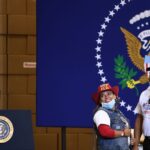
–>
October 23, 2022
There was a time when what was acceptable in media was generally policed. This was the time of the three major networks, who were then accused of controlling public discussion.
‘); googletag.cmd.push(function () { googletag.display(‘div-gpt-ad-1609268089992-0’); }); }
Up until the ’90s, ABC, NBC, and CBS ruled the roost, and they tended to keep extreme viewpoints off of the air. Neo-Nazis, conspiracy theorists never got a hearing. The media were sanitized, to be sure. In the late 1980s, the FOX network started rising, but it followed a similar practice. The only difference is that FOX paraded itself as conservative at that time.
It was not a total suppression of free speech — though some claimed it was — but it was a sort of gatekeeping. Dissident/extremist opinions could not get a hearing.
Some claimed that the media were controlled by the Jews, but with the arrival of FOX — which was owned by the Murdochs, a Christian family — that claim no longer held up. Yet the ADL (Anti-Defamation League of B’nai Brith) addressed the matter in 1999.
‘); googletag.cmd.push(function () { googletag.display(‘div-gpt-ad-1609270365559-0’); }); }
Steven G. Kellman, a professor at the University of Texas in San Antonio, wrote … “[o]f the 100 most powerful people in the industry according to a recent survey by Premiere, most, including the top 12, are Jewish,” but observed, “Though individual Jews control Hollywood, Jewishness does not.” In fact, Hollywood studios are publicly owned corporations and motion pictures are made by the efforts of individual men and women, some of whom are Jewish, many of whom are not.
The ADL sort of shot itself in the foot with that explanation. While it was true that the Jewish executives were not pushing Jewishness, they could still be open to the charge of steering the conversation. All of that came to an end in the mid-’90s.
With the advent of the internet, anyone could publish what he wanted and get it out to the world. All one had to do was set up a website, which was far cheaper than publishing booklets. Search engines made it easy for the public to find such questionable information.
Neo-Nazi websites started sprouting up like weeds. The cat was out of the bag. Prior to the internet, it was hard to find such stuff. With the internet, one could find such stuff in complete anonymity.
Then, in 1996, the U.S. government passed Section 230 of the United States Communications Decency Act, which insulated web hosting providers and companies from much of the legal consequences of what was on their servers. In plain terms, the internet was given a free pass.
So the internet became the Wild West.
‘); googletag.cmd.push(function () { googletag.display(‘div-gpt-ad-1609268078422-0’); }); } if (publir_show_ads) { document.write(“
The first panic was over pornography, which immediately proliferated with fury. The second panic was over anti-semitism. Already by the mid-’90s, the ADL was sounding the alarm.
By 2004, if one entered the word “Jew” in a Google search, the first site to come up was Jew Watch — which had been online since 1998. Jew Watch was a grossly anti-semitic website, which functioned as a library of anti-Jewish material. In a few moments, one had access to information that would have taken years to collect before.
In 2008, Israel’s Foreign Ministry offered a free tool — called Megaphone — whereby Jewish activists could be marshaled to go to chat rooms and contest antisemitic or anti-Israel comments.
[Israel] created Megaphone, a free tool that can be downloaded from their website. Megaphone allows alerts to pop up on users’ desktops every time it finds an attention-worthy article, poll or forum on the internet. Students and members of pro-Israel organizations are encouraged to visit the sites and express their opinions.
Even at that early date, Israel was aware that control of the internet had been lost and was marshaling efforts for a fight.
None of this would have happened — could have happened — before the internet. The mainstream media kept such nonsense out of the public arena. The internet had given voice to the world’s collective id.
And the issue of Israel would not go away.
By 2015, Israel was accusing Facebook of facilitating violence by tolerating incitement on its platform. Palestinians in Judea and Samaria (the West Bank) were using Facebook for nefarious purposes. The Israel Law Center even ran a test to make its point.
Social media hid behind Section 230 protections until they came under congressional fire. They then started censoring, but chiefly against the conservatives.
The problem grew, and the number of students and academics posting vicious anti-semitism online has become a flood. Campus anti-semitism is also out of control. Also see here.
So Jewish groups have started counter-measures, now using the IHRA definition of antisemitism. They hope to rein in academe, and their efforts can be searched (“anti-semitism college”) on YouTube.
But opponents of the IHRA definition have claimed that its definition of antisemitism is far too broad and conflates anti-Zionism with antisemitism. One author of the IHRA says it is being used to suppress free speech.
Kenneth Stern drafted the “working definition of anti-Semitism” that US President Donald Trump used in an executive order to target anti-Semitism on college campuses. He’s also one of the recent order’s most vociferous critics.
Hence, the IHRA definition is not universally applied.
Twitter now bans hateful hashtags such as #Hitlerwasright, but other coded hashtags have arisen, such as #COVID1948. Posters started posting images to get around A.I. word-filtering. The upshot is that there is no way antisemitism can really be suppressed.
Suspend Kanye West, and others will arise.
Europe has tougher laws — under hate crime laws — but there are easy workarounds if one knows what one is doing.
So what is the answer? There is none technologically. The criminal is usually one step ahead of the law. Human nature is ugly. As Psalm 14:1 warns, there is none that doeth good. The internet, especially social media, has given vast amounts of power to fallen humanity, in the persons of hateful individuals.
The answer will be found not technologically, but socially.
On the side of good, one consequence of the internet is underreported: the proliferation of Christian websites.

Image via Libreshot.
<!– if(page_width_onload <= 479) { document.write("
“); googletag.cmd.push(function() { googletag.display(‘div-gpt-ad-1345489840937-4’); }); } –> If you experience technical problems, please write to [email protected]
FOLLOW US ON
<!–
–>
<!– _qoptions={ qacct:”p-9bKF-NgTuSFM6″ }; ![]() –> <!—-> <!– var addthis_share = { email_template: “new_template” } –>
–> <!—-> <!– var addthis_share = { email_template: “new_template” } –>







